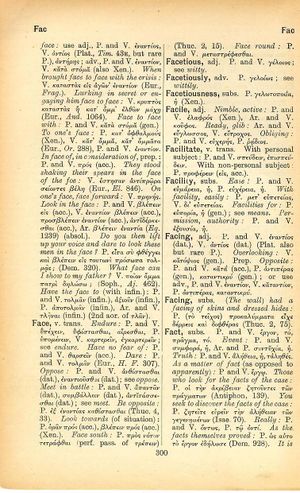fact
τούτων γάρ ἑκάτερον κοινῷ ὀνόματι προσαγορεύεται ζῷον, καί ὁ λόγος δέ τῆς οὐσίας ὁ αὐτός → and these are univocally so named, inasmuch as not only the name, but also the definition, is the same in both cases (Aristotle, Categoriae 1a8-10)
English > Greek (Woodhouse)
substantive
P. and V. ἔργον, τό, πρᾶγμα, τό.
event: P. and V. συμφορά, ἡ, Ar. and P. συντυχία, ἡ.
truth: P. and V. ἀλήθεια, ἡ, τἀληθές.
as a matter of fact (as opposed to apparently): P. and V. ἔργῳ.
those who look for the facts of the case: P. οἱ τὴν ἀκρίβειαν ζητοῦντες τῶν πραγμάτων (Antiphon, 139).
you seek to discover the facts of the case: P. ζητεῖτε εὐρεῖν τὴν ἀλήθειαν τῶν γεγενημένων (Isaeus 70).
really: P. and V. ὄντως, P. τῷ ὀντί.
as the facts themselves proved: P. ὡς αὐτὸ τὸ ἔργον ἐδήλωσε (Dem. 928).
it is not the same thing to state a surmise and proclaim what is said as a fact: V.τοὐτὸ δ' οὐχὶ γίγνεται δόκησιν εἰπεῖν κἀξακριβῶσαι λόγον (Soph., Trachiniae 425).

